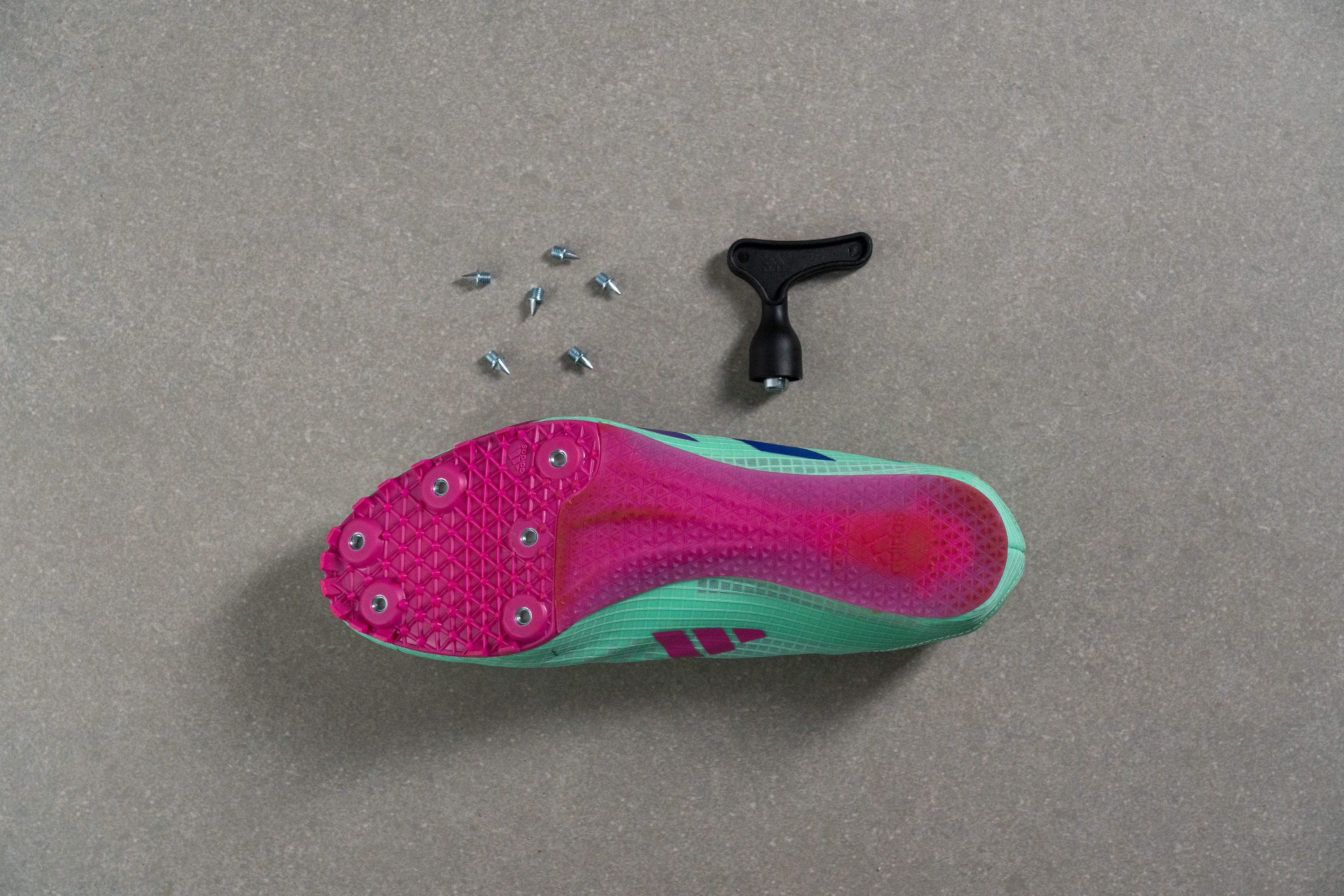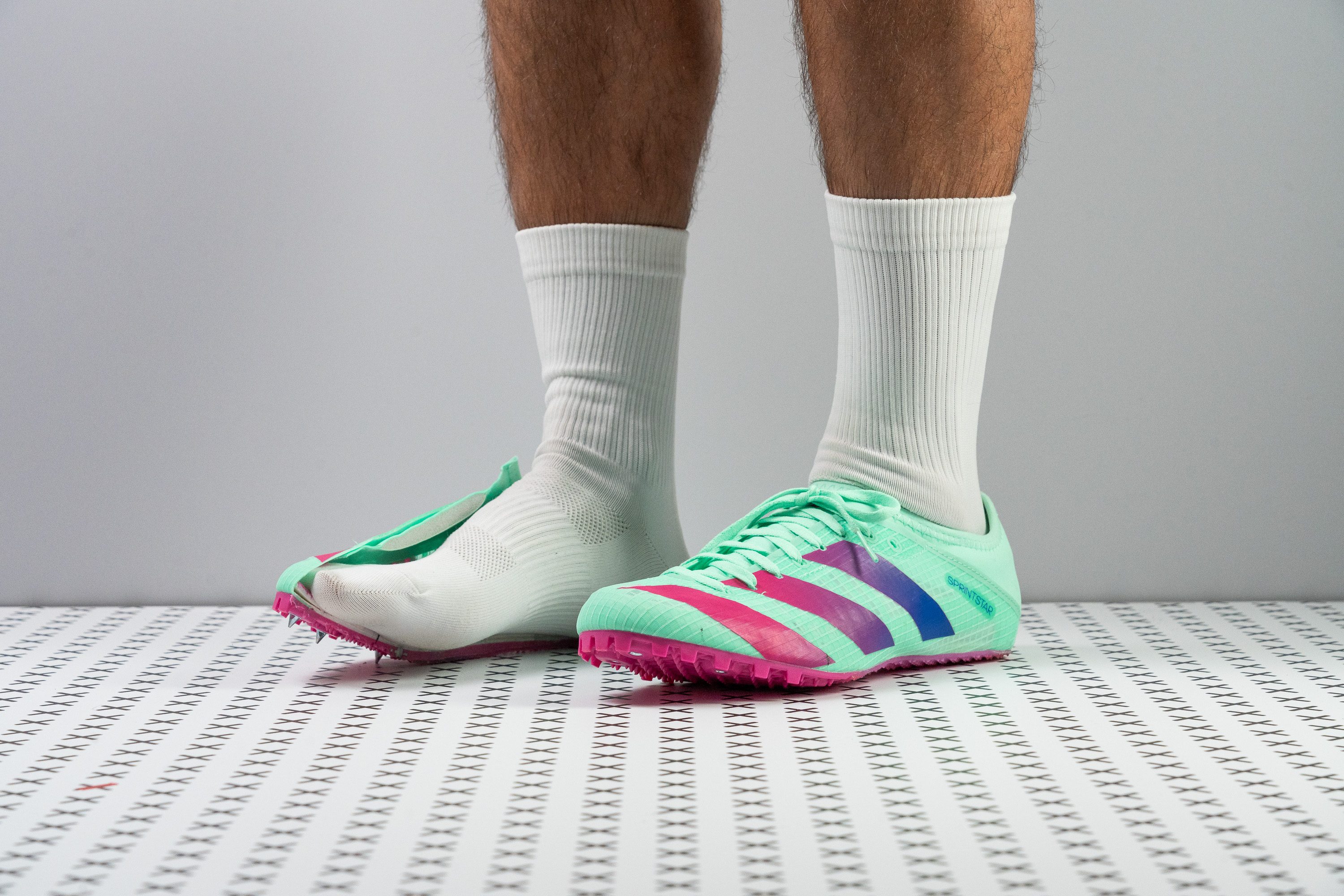Our verdict
- Top pick in best running spikes
- Top pick in best sprint running spikes
Pros
- Excellent track grip
- Ultra-padded tongue
- Unbeatable value
- Removable pins
- Ideal for novices
- Exceptional ground sensation
- Solid durability
Cons
- Zero cushioning
- Poor ventilation
- Requires strong feet
Audience verdict
Comparison
The most similar running spikes compared
+ + Add a shoe | |||||
|---|---|---|---|---|---|
| Audience score | 89 Good! | 90 Great! | 91 Great! | 96 Superb! | |
| Price | £70 | £160 | £80 | £130 | |
| Weight lab | 6.2 oz / 176g | 5.5 oz / 156g | 6.1 oz / 174g | 5.1 oz / 145g | |
| Breathability | Warm | Breathable | Breathable | Moderate | |
| Use | Sprints | HurdlesSprints | Sprints | Sprints | |
| Removable spikes | ✓ | ✓ | ✓ | ✓ | |
| Width / fit | Medium | Medium | Medium | Medium | |
| Toebox width | Narrow | Medium | Medium | Medium | |
| Drop lab | 1.8 mm | 0.0 mm | 3.3 mm | 0.0 mm | |
| Size | Slightly small | Slightly small | Half size small | True to size | |
| Midsole softness | - | - | Balanced | - | |
| Tongue padding | Very thick | Average | Average | Thick | |
| Stiffness | Moderate | Moderate | Flexible | Moderate | |
| Torsional rigidity | Moderate | Moderate | Moderate | Flexible | |
| Heel counter stiffness | Flexible | Flexible | Flexible | Flexible | |
| Outsole thickness | Average | Very thick | Average | Thick | |
| Outsole hardness | Very hard | - | - | - | |
| Heel tab | None | Finger loop | None | None | |
| Heel stack lab | 10.4 mm | 12.3 mm | 13.3 mm | 11.2 mm | |
| Forefoot | 8.6 mm | 12.3 mm | 10.0 mm | 11.2 mm | |
| Insole thickness | Thick | Average | Average | Very thick | |
| Midsole width - forefoot | Narrow | Very narrow | Narrow | Very narrow | |
| Midsole width - heel | Very narrow | Very narrow | Average | Very narrow | |
| Ranking | #10 Bottom 23% | #9 Bottom 30% | #6 Top 47% | #2 Top 16% | |
| Popularity | #12 Bottom 7% | #4 Top 31% | #8 Bottom 38% | #7 Bottom 46% |
Who should buy
We think the Adidas Sprintstar is a smart pick for:
- Track beginners eager to test their raw speed in short sprints from 60 to 400 metres.
- Runners on a tight budget looking for a low-priced sprint spike that still offers top-notch comfort.
- Road runners keen on adding a spike to their gear for occasional quick sprints at the track.
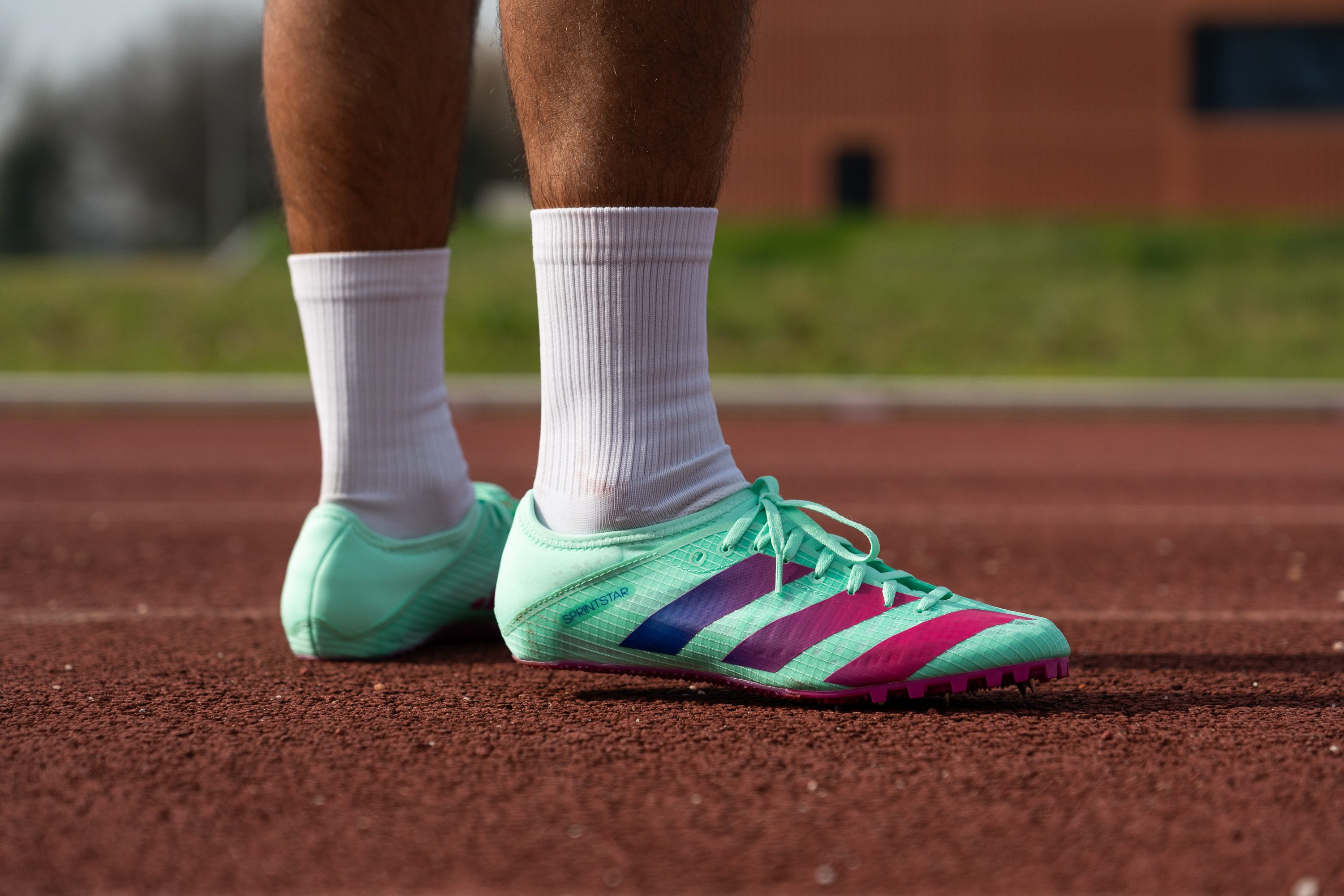
Who should NOT buy
The Sprintstar is a classic, no-frills spike where your feet do all the work. There's no energy-returning midsole, meaning faster leg fatigue and increased strain on your foot muscles.
If you crave that modern, super-cushioned feel underfoot, we strongly suggest exploring pricier options like the Nike Air Zoom Maxfly or Adidas Prime SP2.
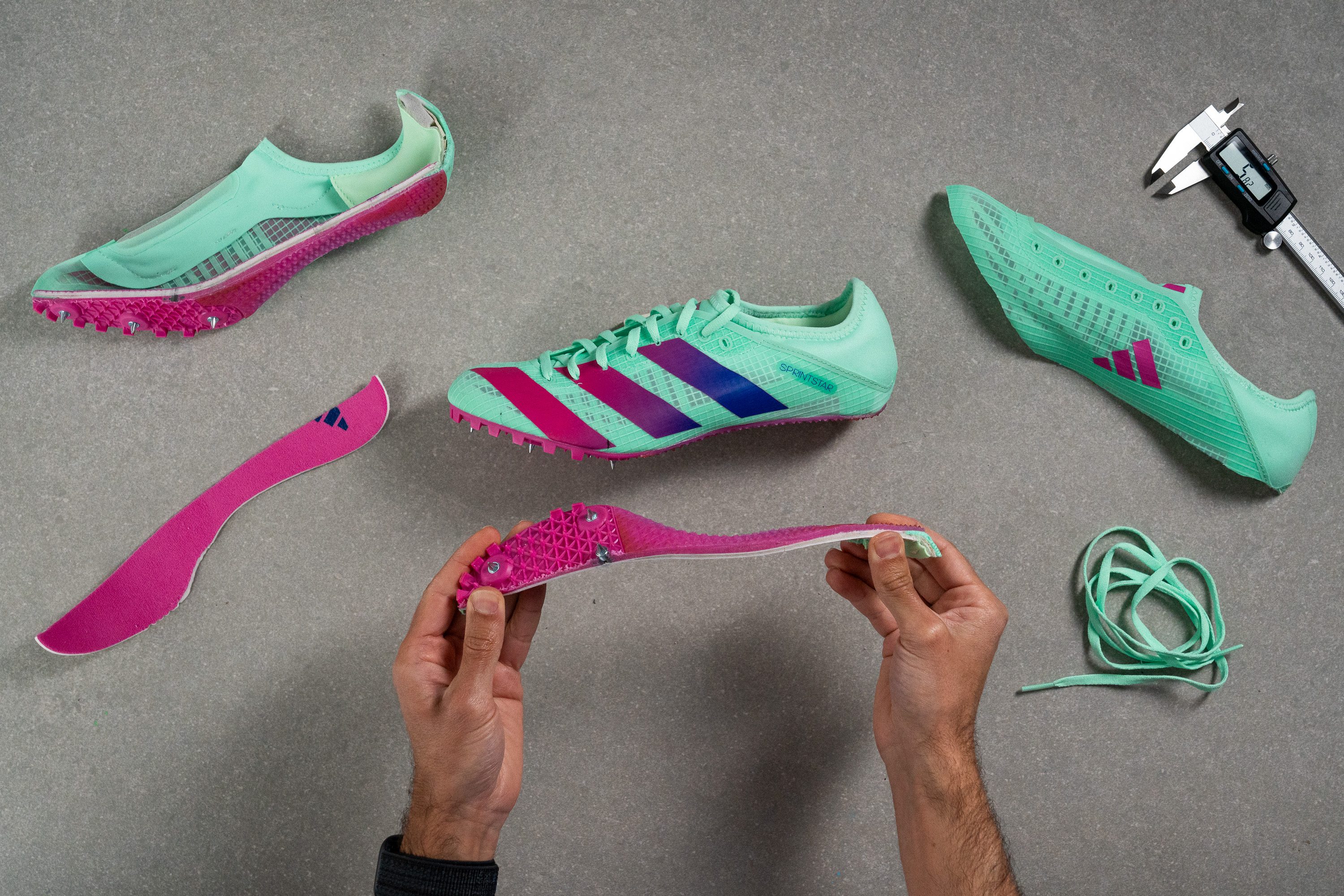
Furthermore, the Sprintstar won't be the best pick for versatility in the track. If you sometimes enjoy the long stuff, this spike will quickly reach its limits of comfort and support. For a more do-it-all spike, we recommend something like the Nike Zoom Rival D 10, a solid entry-level choice.
Cushioning
Heel stack
In the heel, we discovered a paper-thin stack height of 10.4 mm. Right from our first run in these spikes, it was evident they were all about ground feel—this measurement absolutely confirms it.
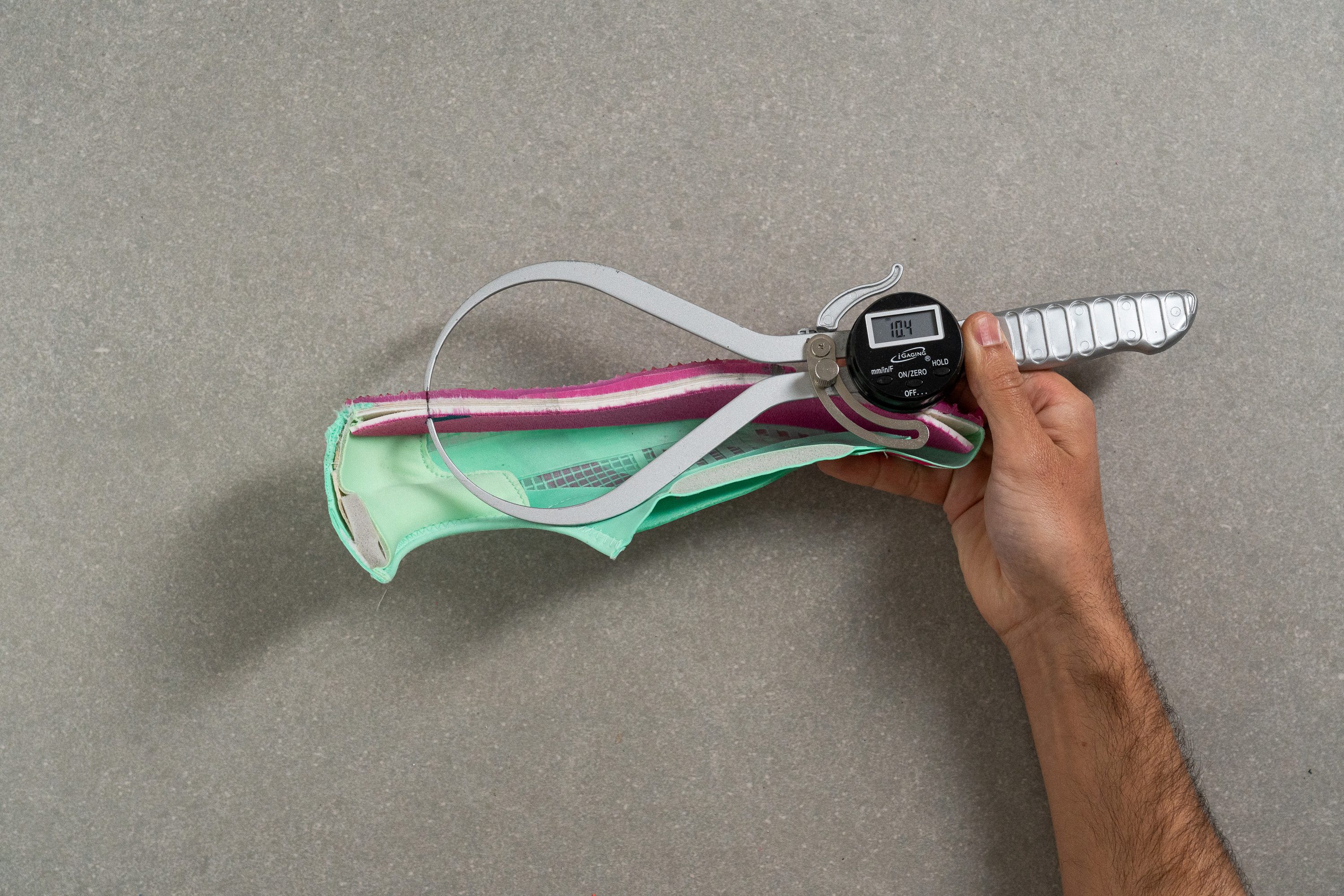
| Sprintstar | 10.4 mm |
| Average | 16.0 mm |
Forefoot stack
The forefoot is slightly thinner than the heel at just 8.6 mm.
With such a low stack height, you'll need to push hard with your legs—don't expect any energy return from the midsole.
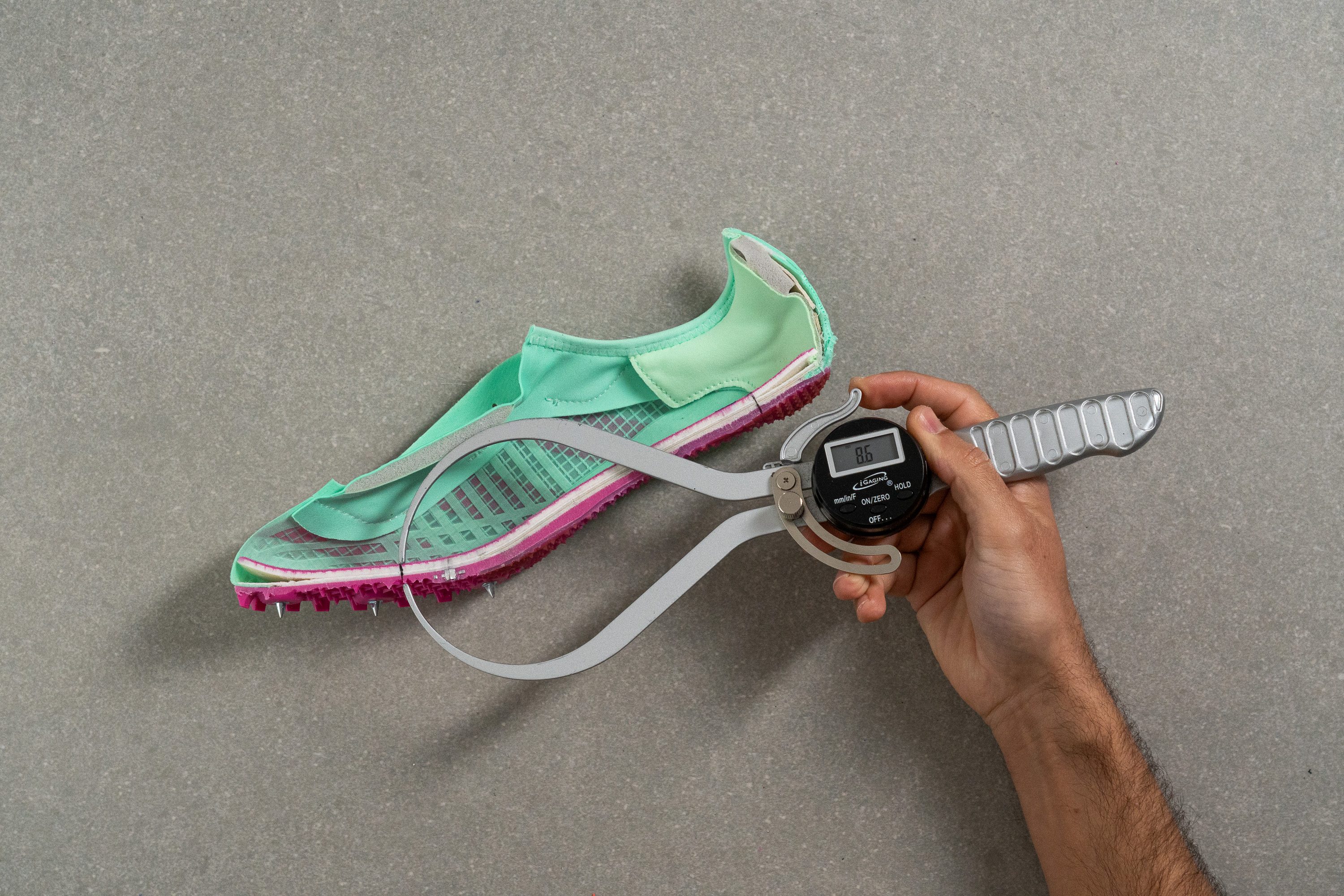
| Sprintstar | 8.6 mm |
| Average | 15.3 mm |
Drop
The drop isn't negative like in many other sprint spikes, making this one a bit friendlier for those with recurrent calf or Achilles tendon issues. We measured it at 1.8 mm.
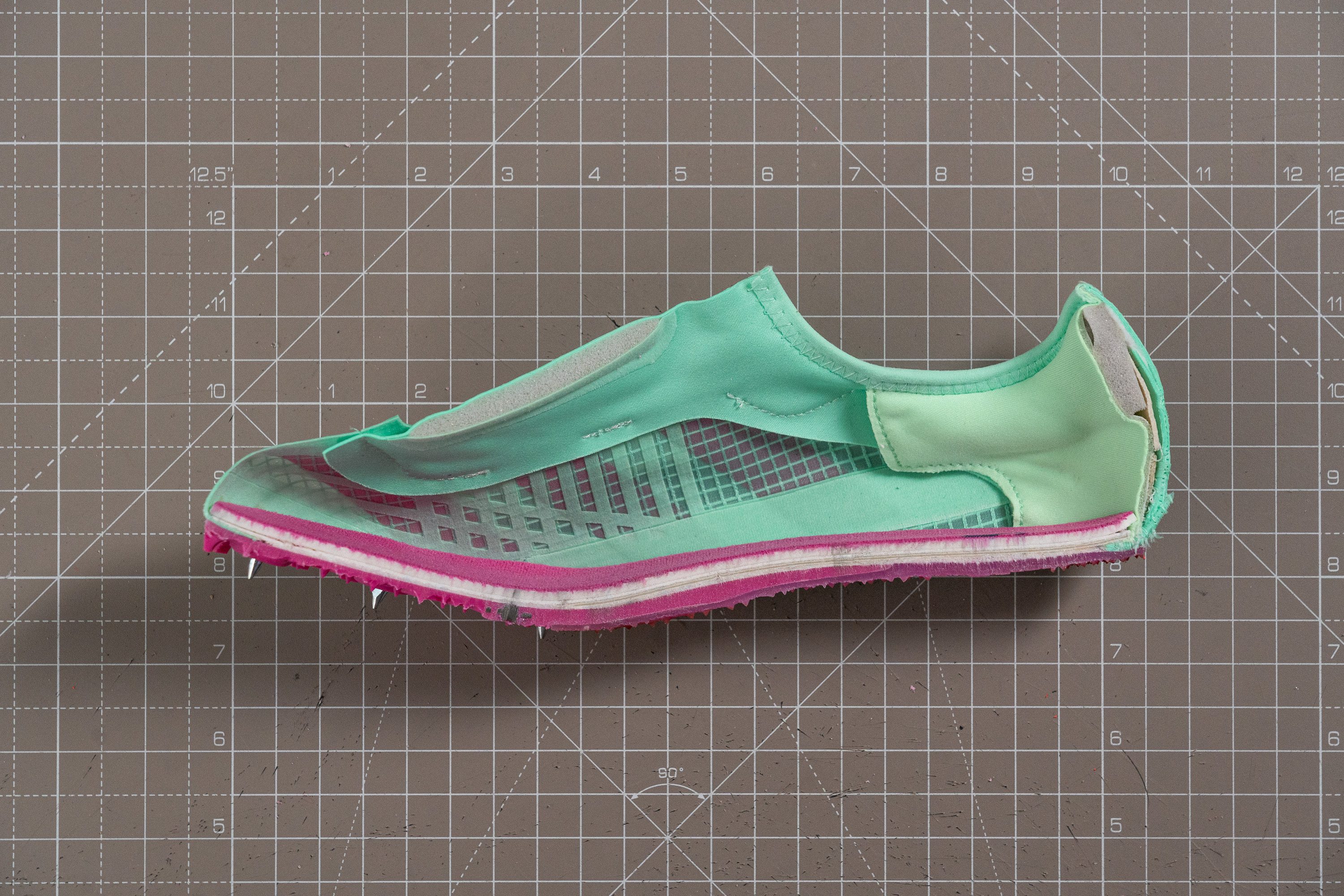
| Sprintstar | 1.8 mm |
| Average | 0.7 mm |
Size and fit
Size
Adidas Sprintstar fits slightly small (31 votes).
Internal length
| Sprintstar | 260.1 mm |
| Average | 262.3 mm |
Width / Fit
We found that the Adidas Sprintstar offers a pretty snug intimate fit for a medium-width foot. To check if this is indeed true, we created a mould of the spike's interiors using proprietary gel.
The calliper measurement confirmed our initial impression with a standard reading of 88.5 mm in the widest part of the shoe.
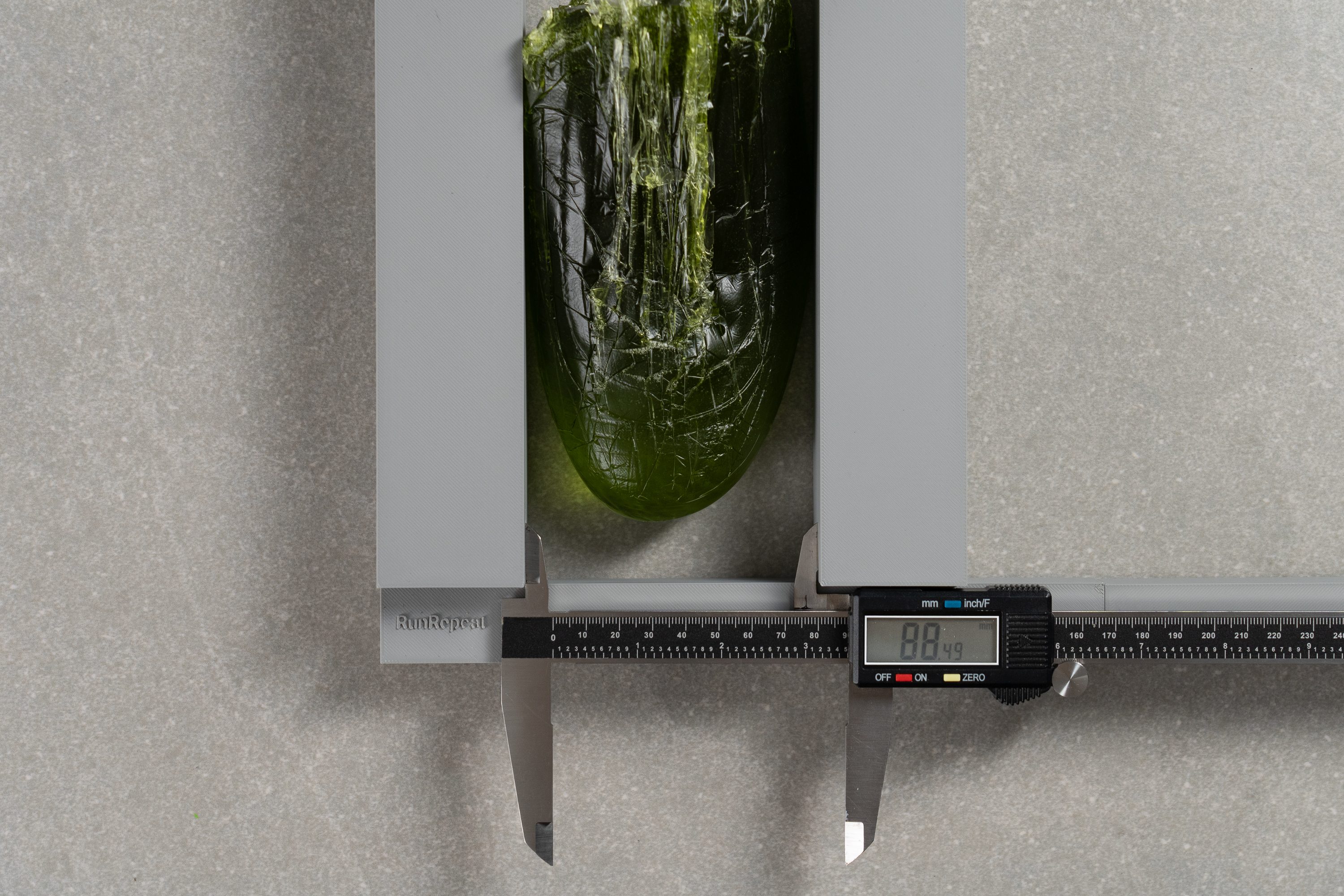
| Sprintstar | 88.5 mm |
| Average | 88.4 mm |
Toebox width
However, it's mostly the shoe's dramatic taper angle that makes it so close-fitting. Our precise calliper measurement of 69.5 mm in the big toe area confirms the spike's aggressive, streamlined design.
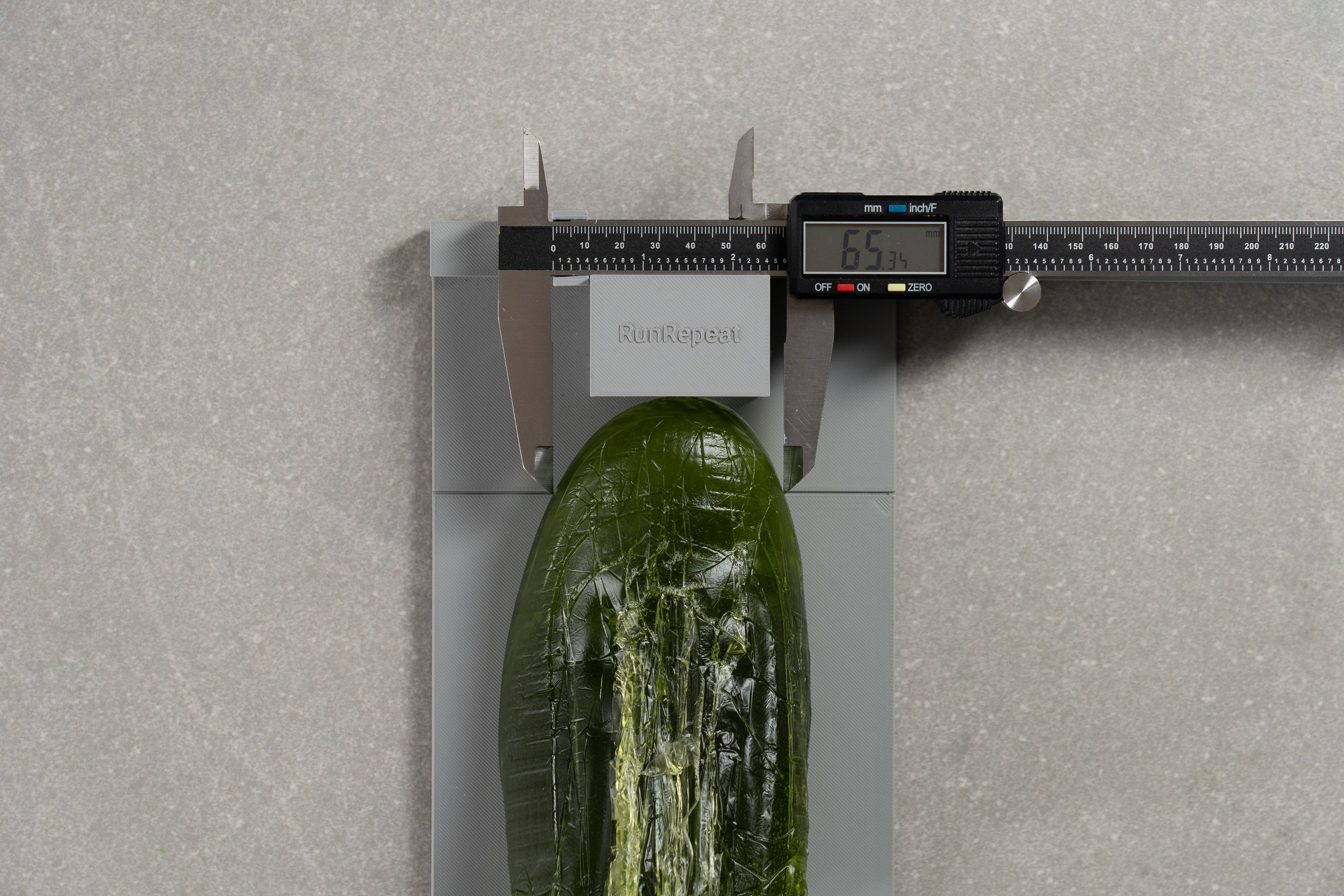
| Sprintstar | 65.3 mm |
| Average | 69.0 mm |
Toebox height
We also founed the Sprintstar's vertical space to be quite limited with a toebox height of only 24.8 mm.
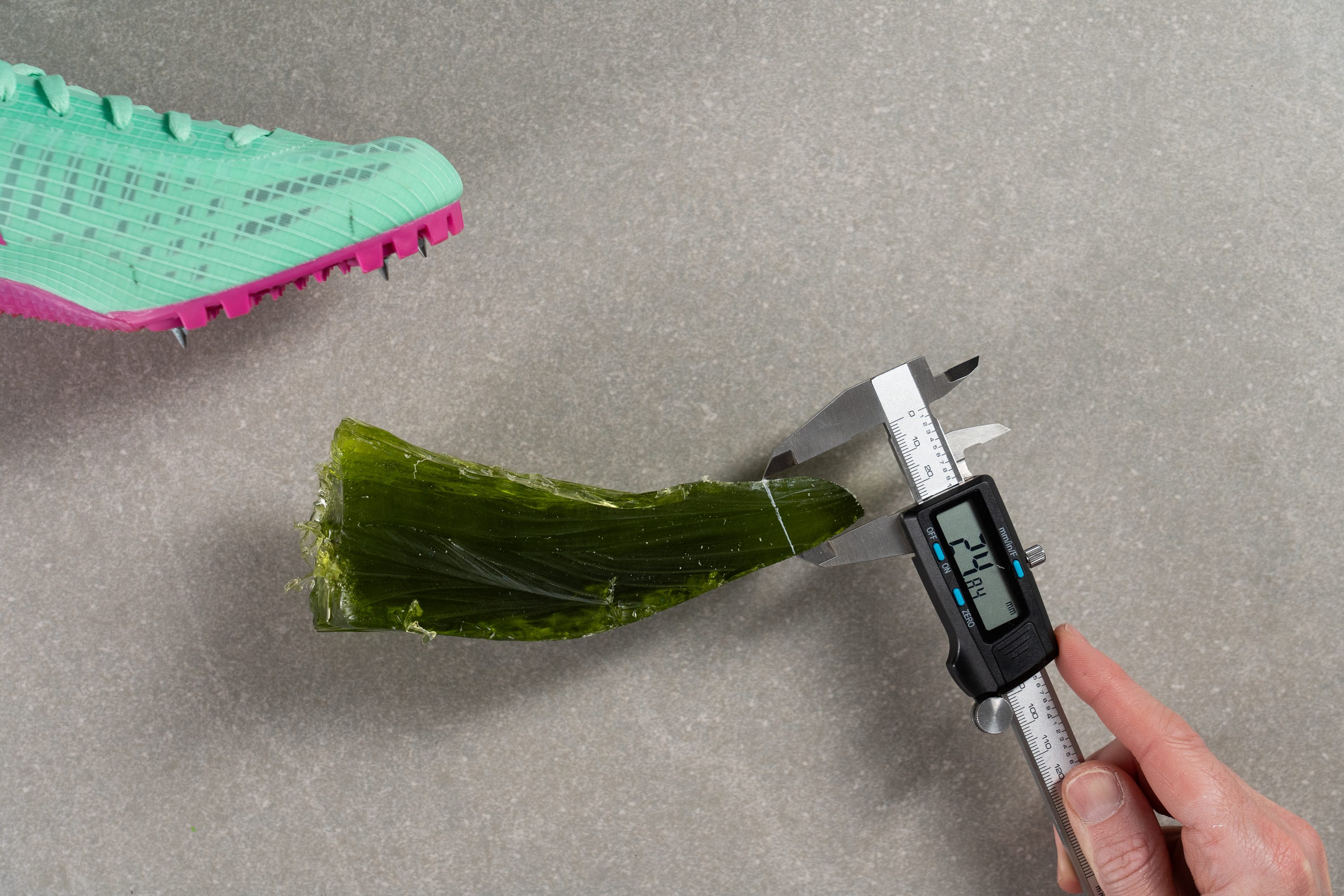
| Sprintstar | 24.8 mm |
| Average | 25.8 mm |
Flexibility / Stiffness
This is a plateless spike, making it ideal for those who prefer a flexible, natural feel. In fact, we only needed to apply 14.5N of force to bend it to 30 degrees, which is around the average track spike, far away from the sky-high stiffness of carbon-plated options.
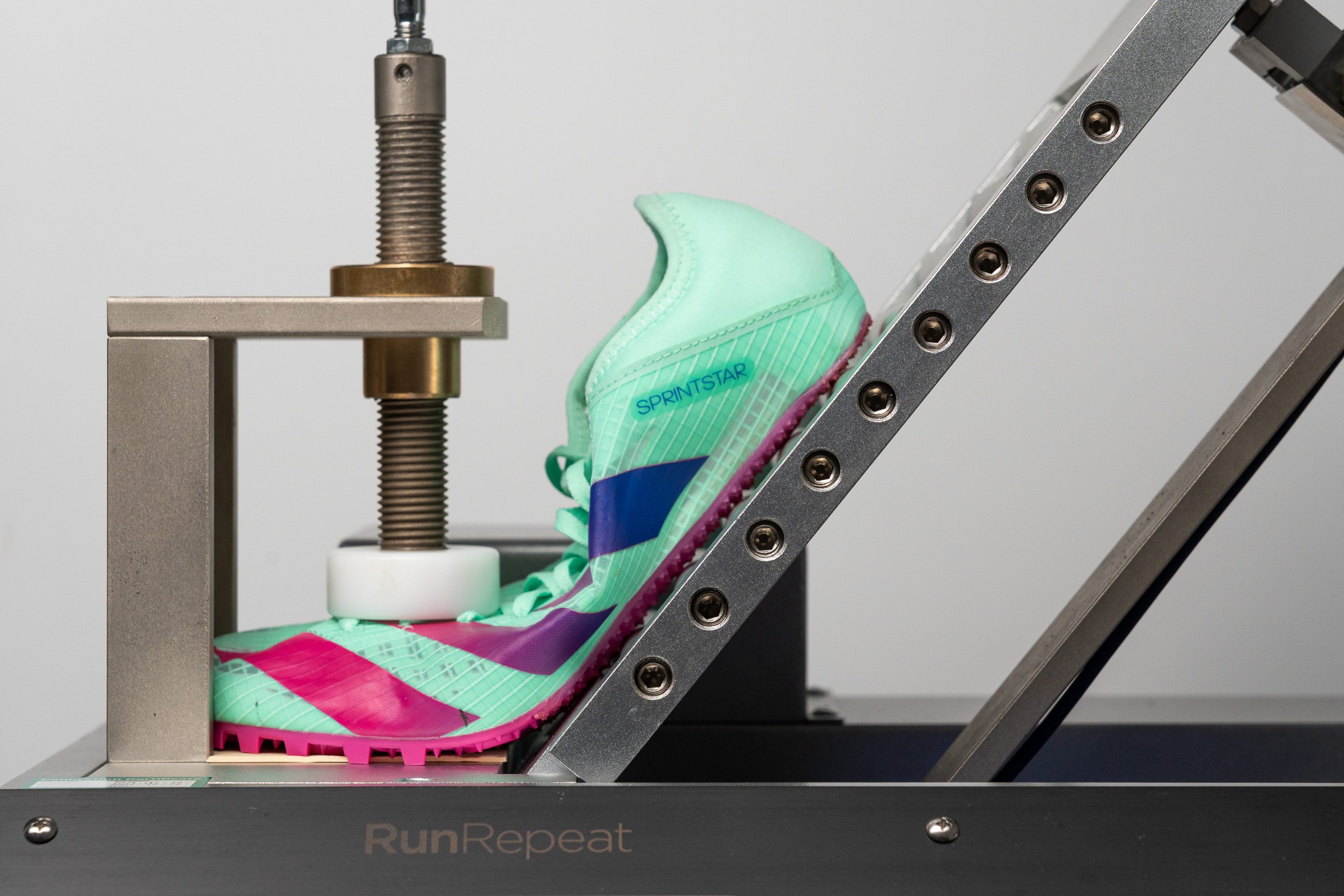
| Sprintstar | 14.5N |
| Average | 13.2N |
Weight
Weighing in at a noticeable 6.2 oz (176g), the Sprintstar clearly isn't striving for a featherweight title. This bulk becomes even more glaring considering its complete lack of foam in the midsole.
However, we should remember the budget price point—lightweight performance materials tend to drastically drive up cost.
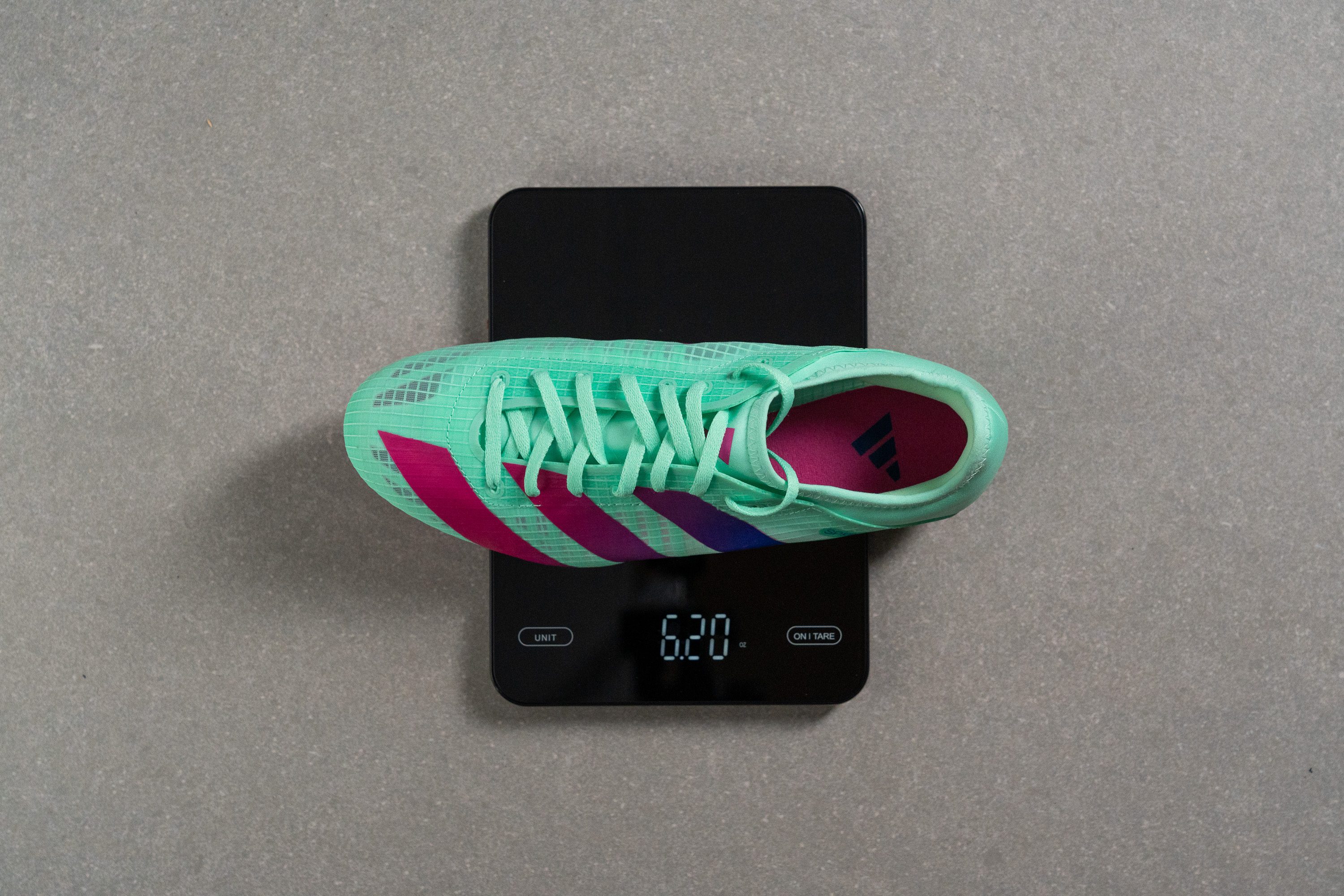
| Sprintstar | 6.2 oz (176g) |
| Average | 5.6 oz (158g) |
Breathability
We discovered subpar breathability in our initial assessment of the budget-friendly Speedstar, earning a disappointing 2/5 score.
The issue stems from design choices; the toebox features a dense, restrictive mesh, while thinner ventilation zones are placed in less crucial midfoot areas. This becomes obvious under our light test.
Microscopic analysis revealed the thick, airflow-resistant Celermesh in the toebox.
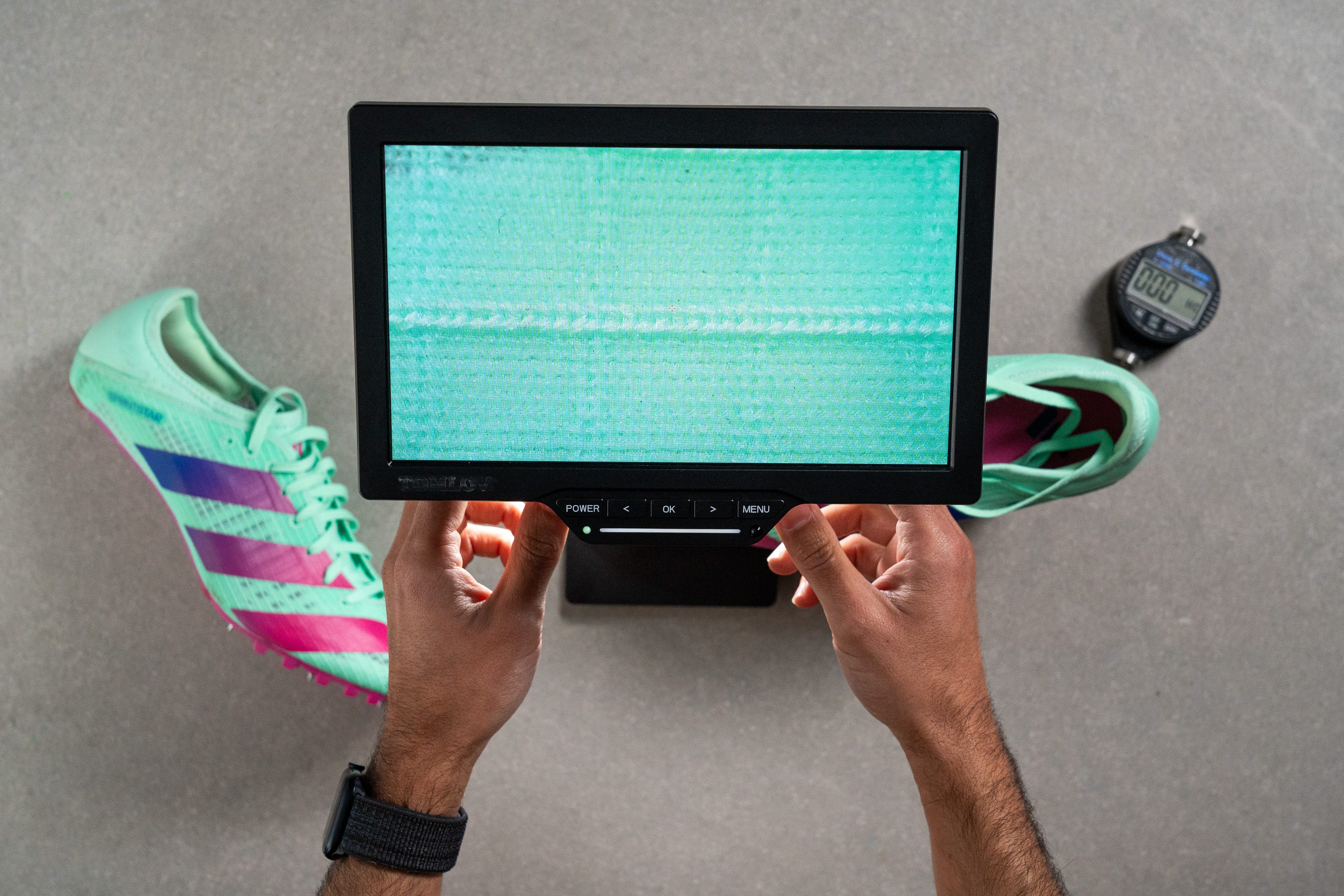
This construction presents a barrier, rather than promoting efficient ventilation.
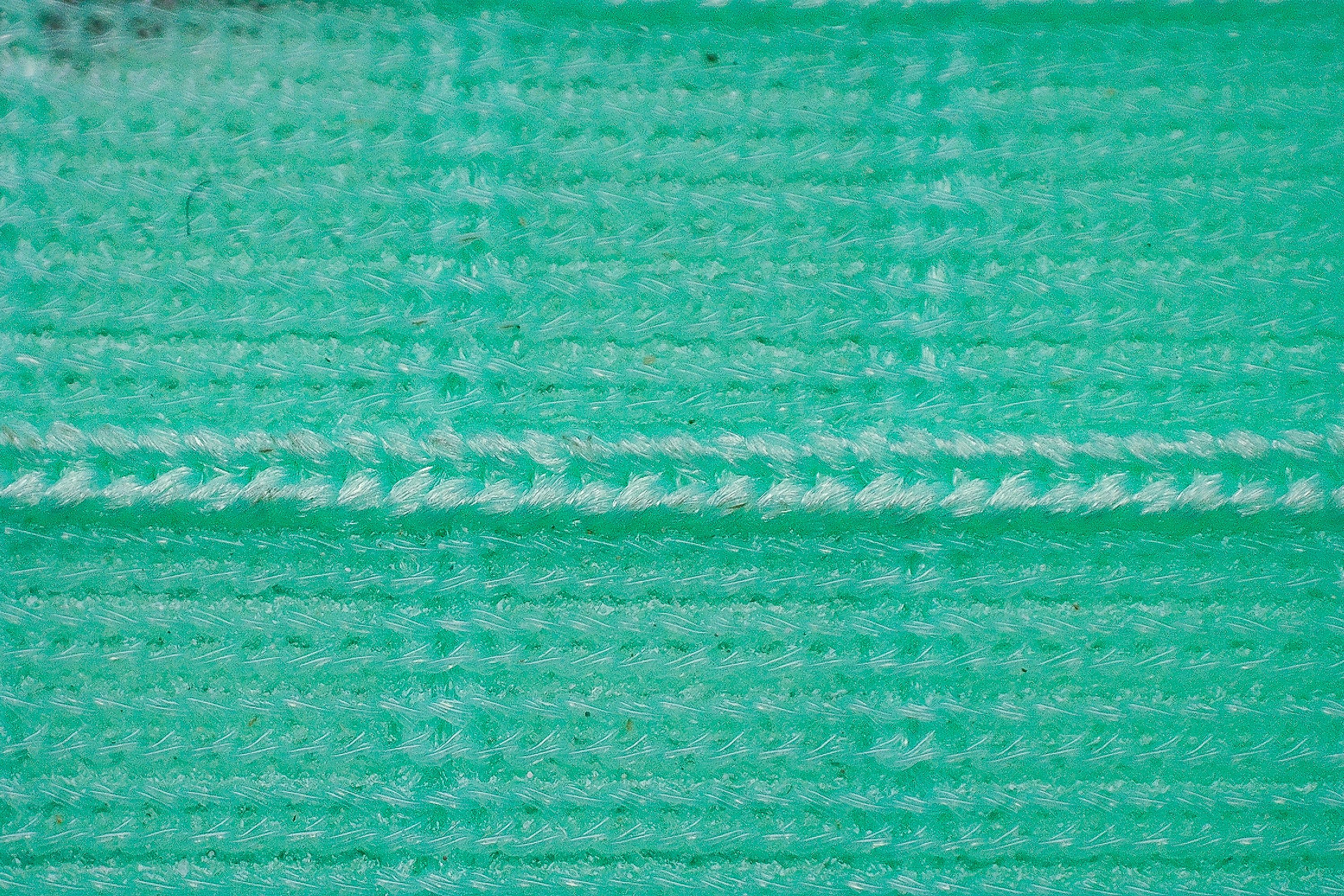
We concluded this section with a hands-on upper assessment.
While surprisingly well-padded for a sprint spike, the Speedstar's materials do reflect its lower price point.
| Sprintstar | 2 |
| Average | 4.1 |
Stability
Torsional rigidity
Though the rest of the shoe feels surprisingly unstructured and flexible, our twist-and-bend test exposed notable, 3-out-of-5 rigidity.
| Sprintstar | 3 |
| Average | 3.3 |
Heel counter stiffness
The heel counter in this spike is exactly what you'd expect for its category, earning a 2/5 stiffness rating.
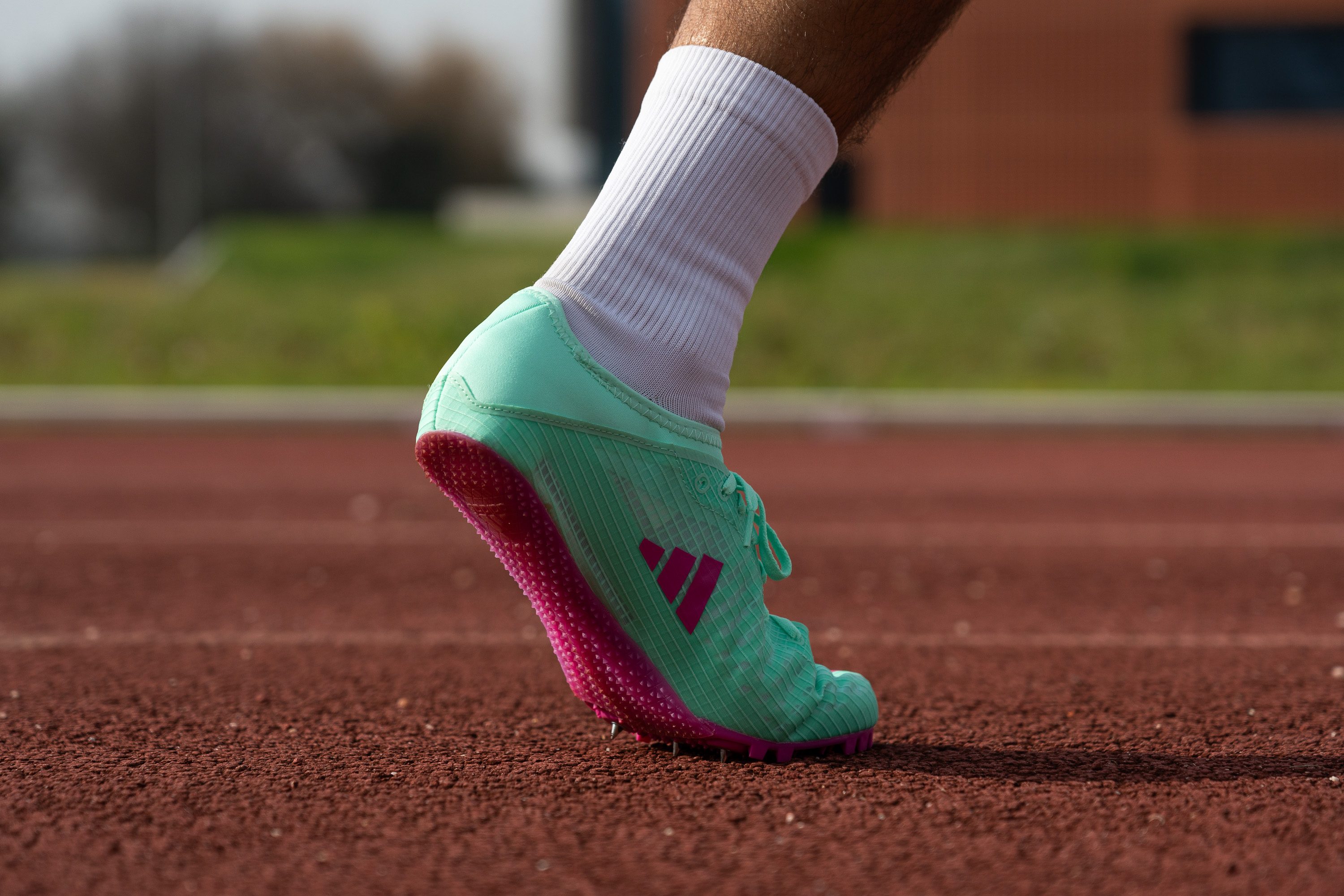
We observed that it lacks any rigid structure, offering flexibility that makes it gentler on the foot shape. This could be an excellent choice for sprinters who experience Achilles issues such as Haglund's deformity.
| Sprintstar | 2 |
| Average | 1.7 |
Midsole width - forefoot
Using our precision digital callipers, we measured the thickest part of the midsole, discovering a width of just 90.1 mm. As expected in a spike designed for speed and agility, this translates to a narrow, streamlined fit.
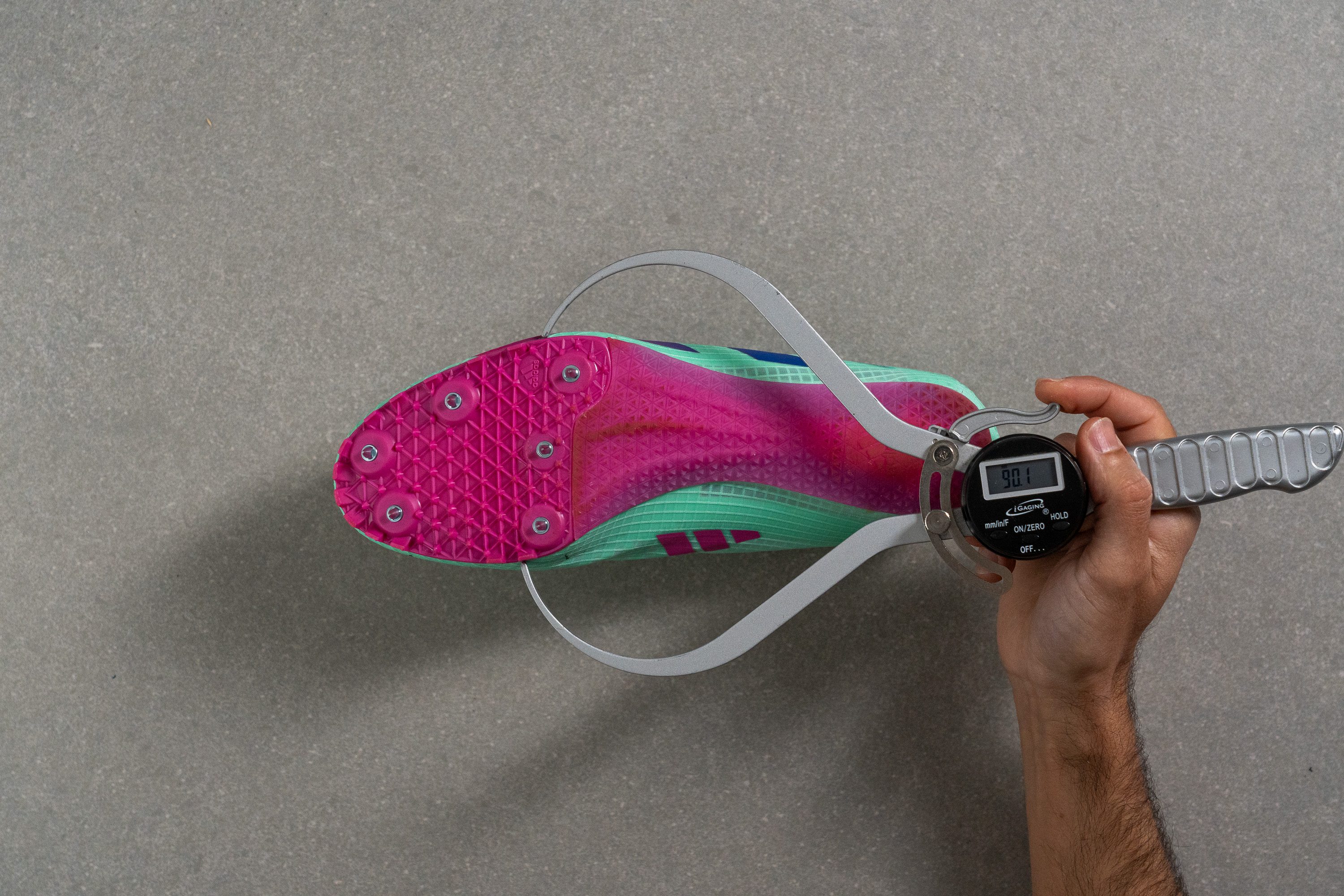
| Sprintstar | 90.1 mm |
| Average | 95.1 mm |
Midsole width - heel
The heel design pushes the limits of a narrow fit, clocking in at only 55.0 mm. We think that this makes it a risky choice for sprinters who rely on some heel stability.
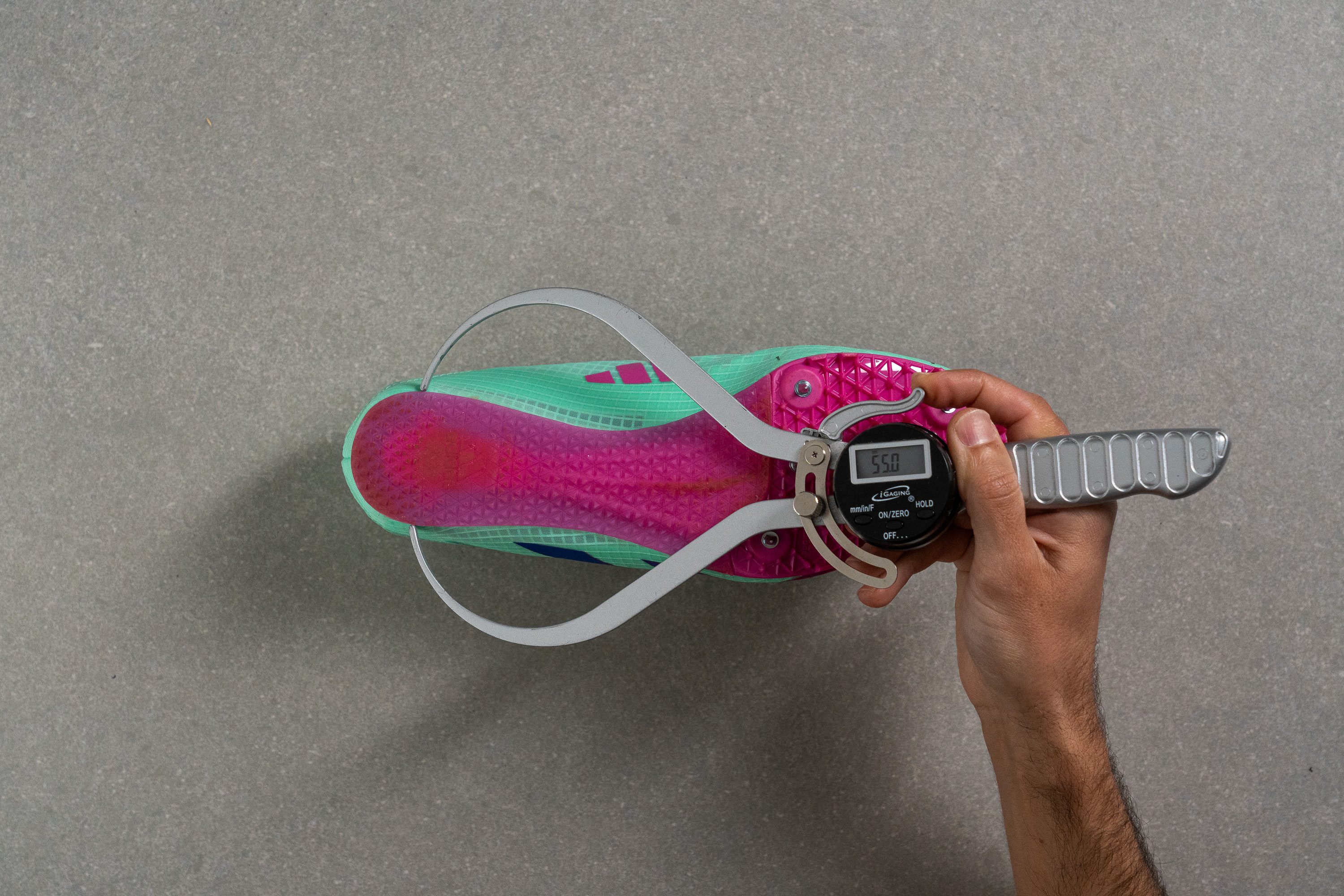
| Sprintstar | 55.0 mm |
| Average | 63.0 mm |
Durability
Toebox durability
Most shoes with disappointing breathability tests excel when it comes to durability. Why? Well, we found in the lab that thicker, denser mesh means those materials have greater toughness and resistance to breakdown.
It was no surprise then when the Sprintstar earned a phenomenal 5/5 durability score! Our Dremel barely scratched the surface of that super-tough toebox. This shoe is simply built to withstand the demands of explosive, sockless training sessions.
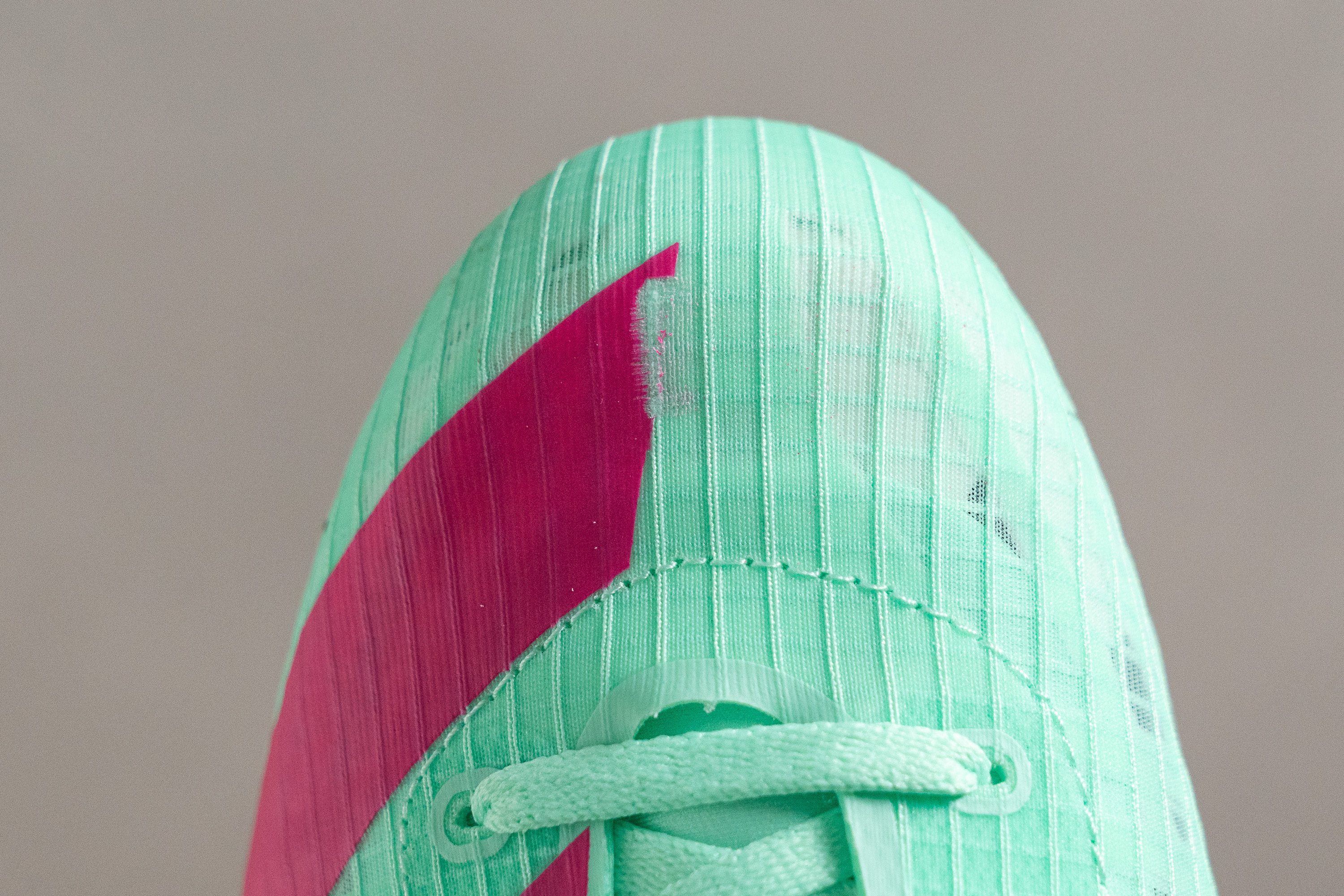
| Sprintstar | 5 |
| Average | 2.4 |
Heel padding durability
We were seriously impressed by the heel padding! This spike boasts unbelievably plush cushioning for the Achilles tendon.
Durability also gets a thumbs up. The padding withstood our Dremel test admirably, earning a strong 4/5 score.
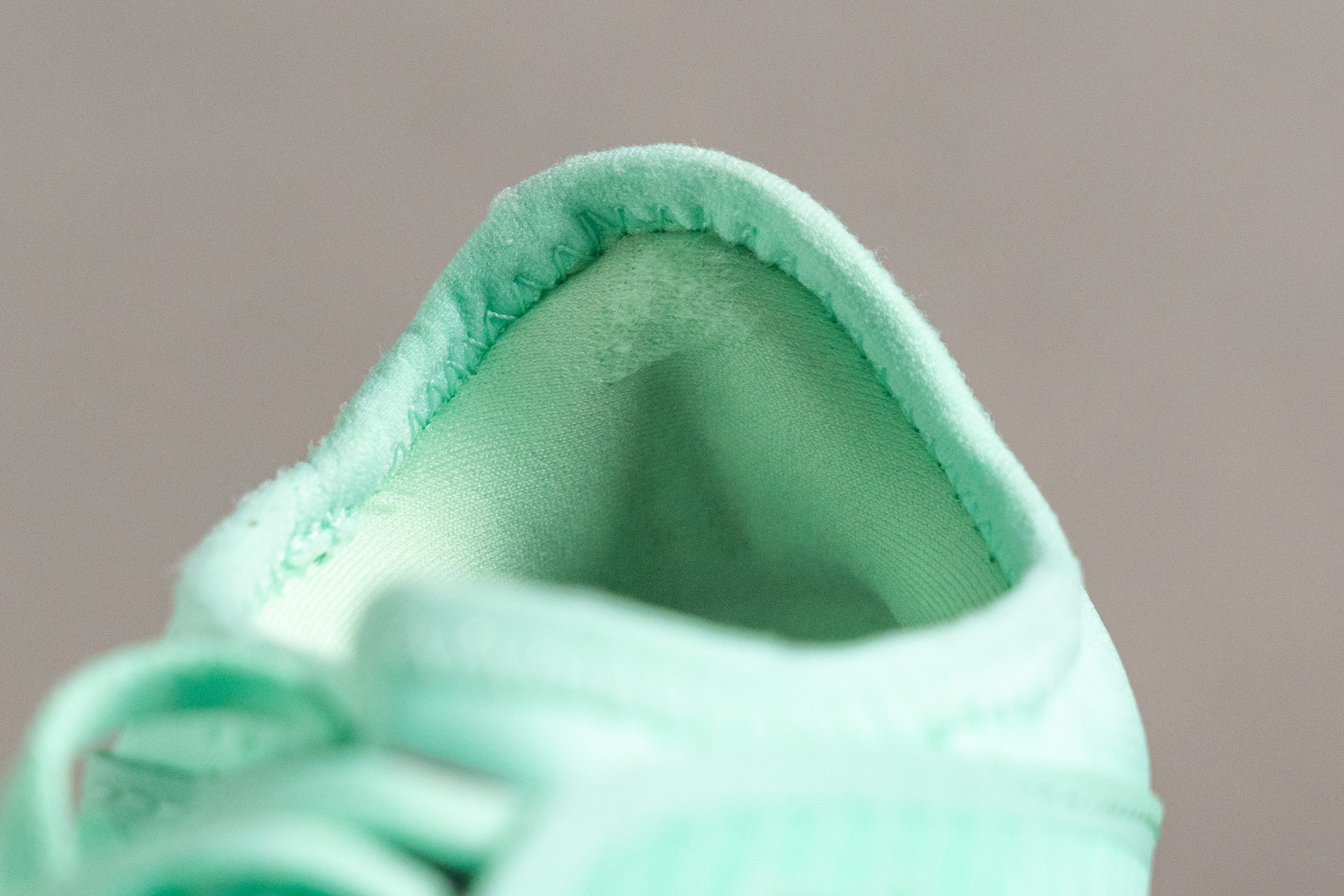
| Sprintstar | 4 |
| Average | 3.6 |
Outsole thickness
The outsole features a Pebax plate and stands out with its thickness at 3.3 mm—unusual for a track spike. It seems to us that Adidas prioritized durability above all else in this design.
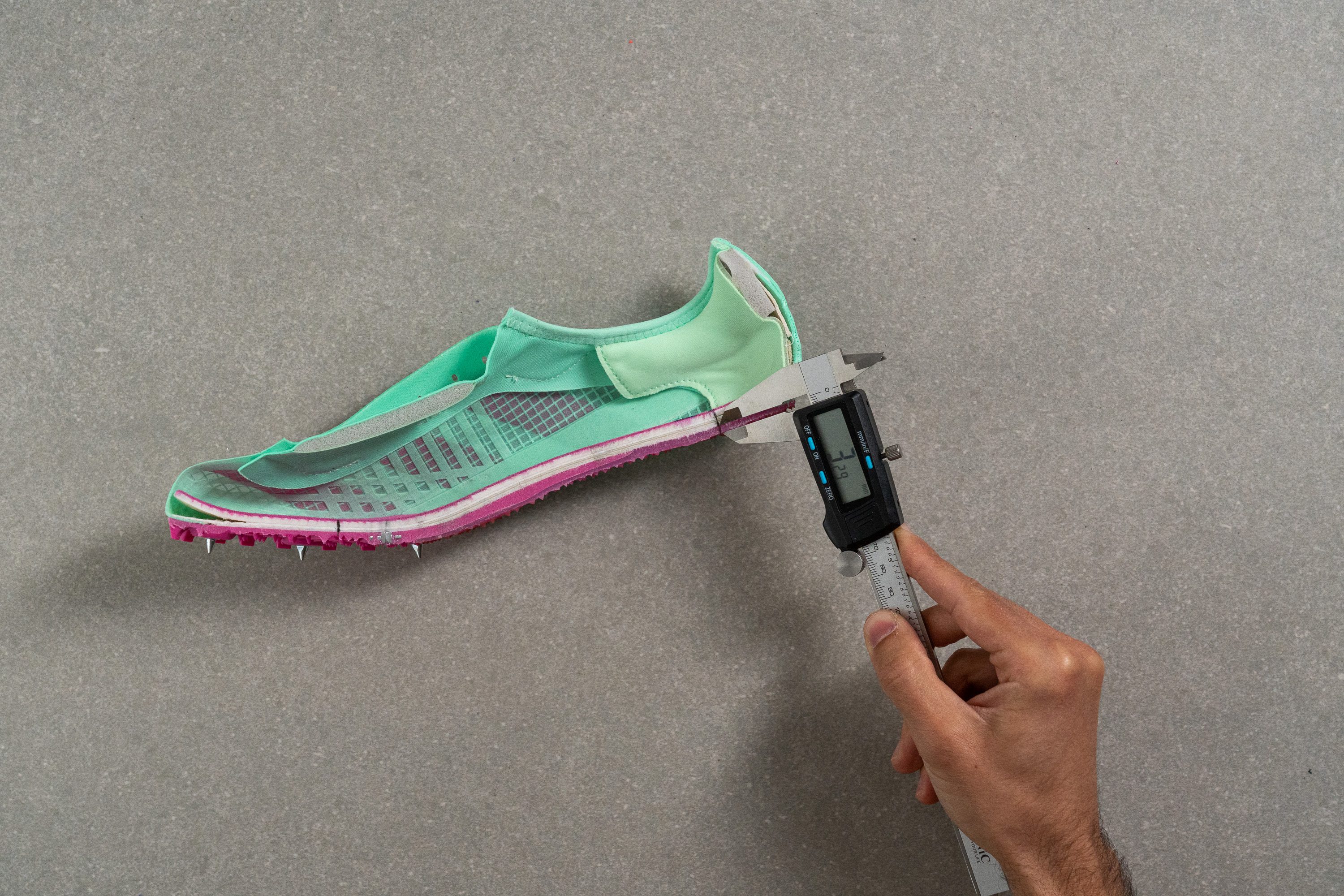
| Sprintstar | 3.3 mm |
| Average | 2.7 mm |
Outsole hardness
We also found that they opted for a very hard outsole, once again focusing heavily on durability. We clocked its hardness at an impressive 88.0 HC using our Shore C durometer.
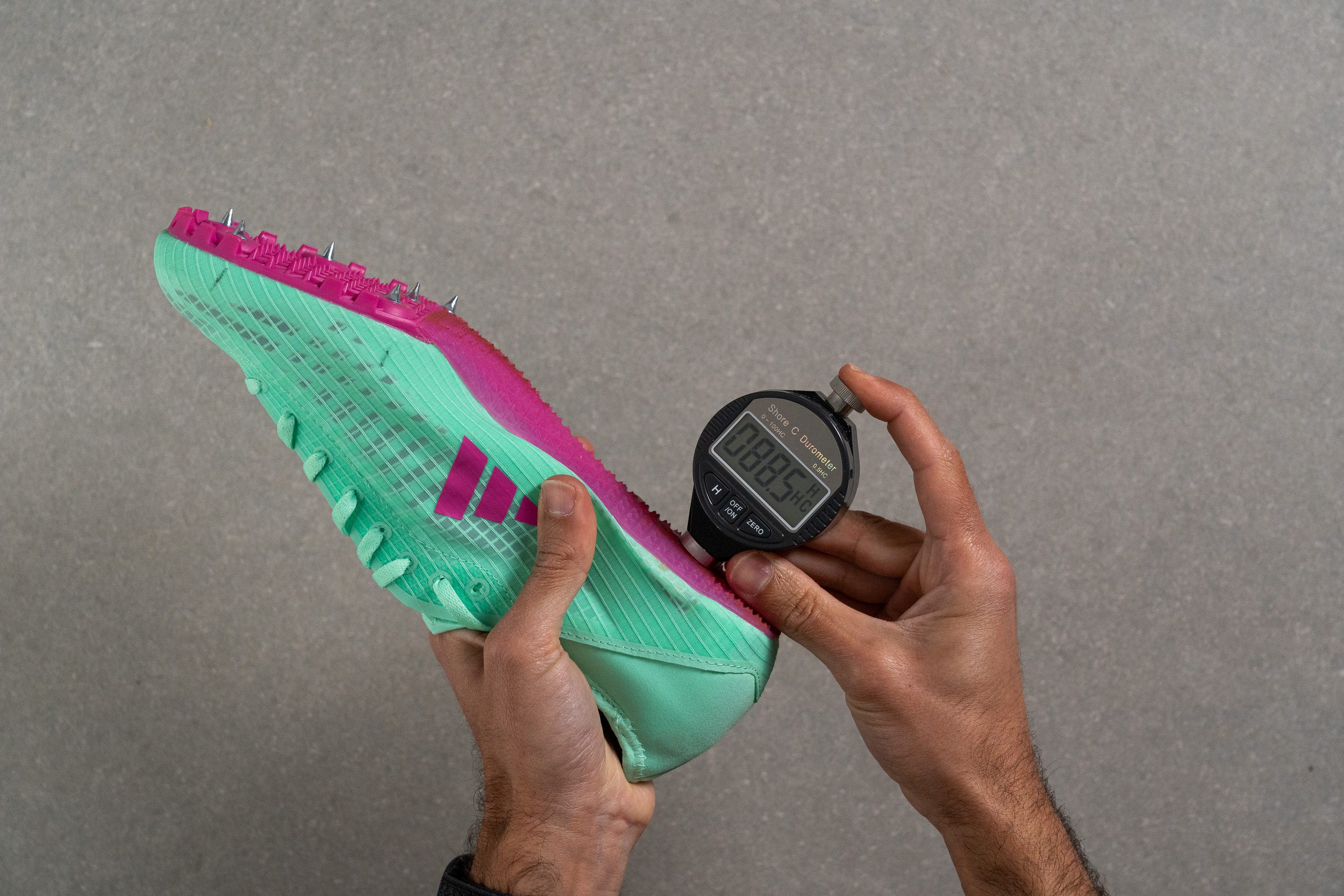
| Sprintstar | 88.0 HC |
| Average | 74.4 HC |
Misc
Insole thickness
We discovered that nearly all the cushioning you'll get from the Sprintstar comes from the 3.4 mm insole, since there's absolutely no foam in its midsole.
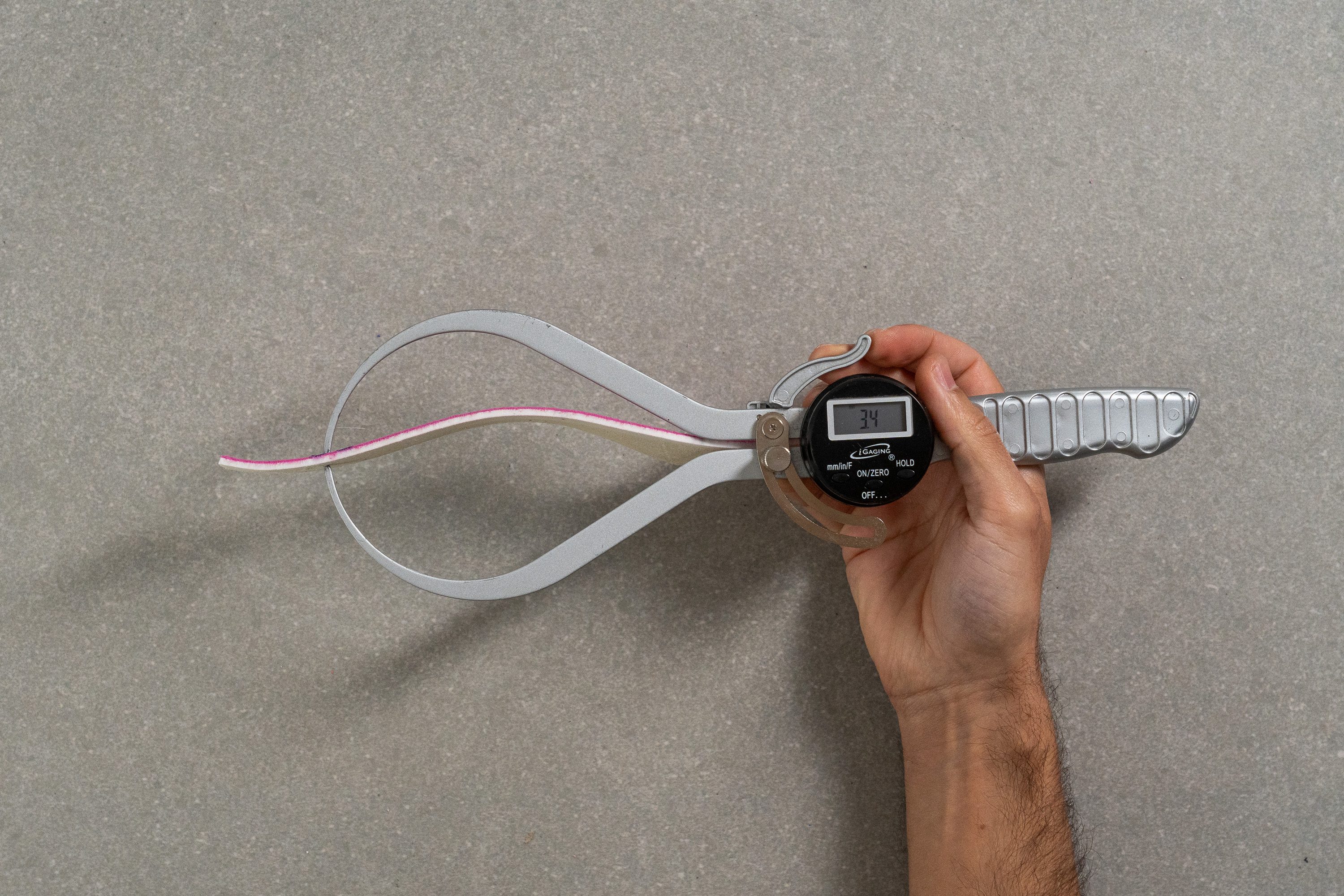
| Sprintstar | 3.4 mm |
| Average | 2.9 mm |
Tongue padding
The tongue boasts an unexpected 7.5mm of plush padding, rarely seen in sprint spikes.
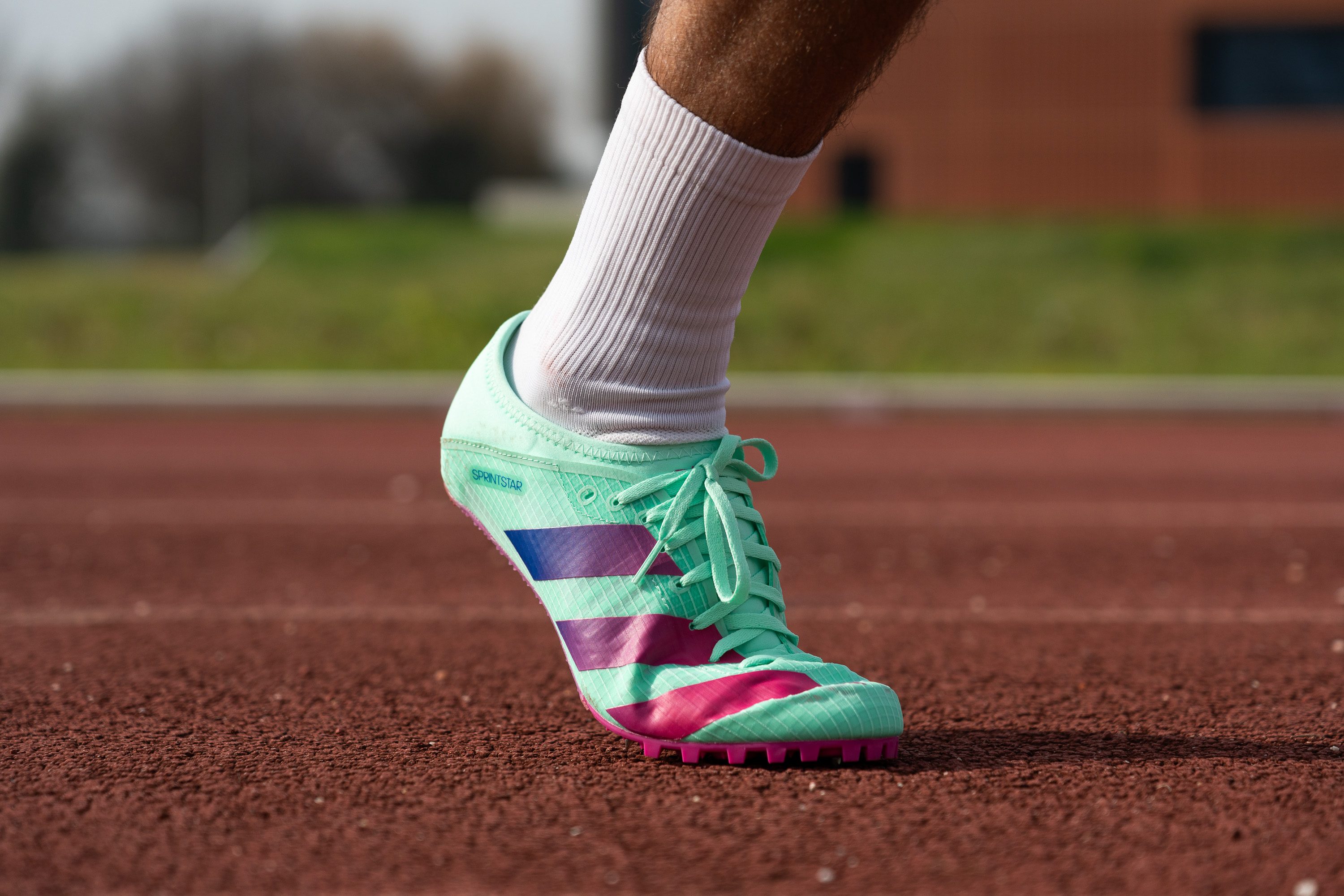
Those who love a tightly-laced, locked-down fit will appreciate the Sprintstar's exceptional comfort.
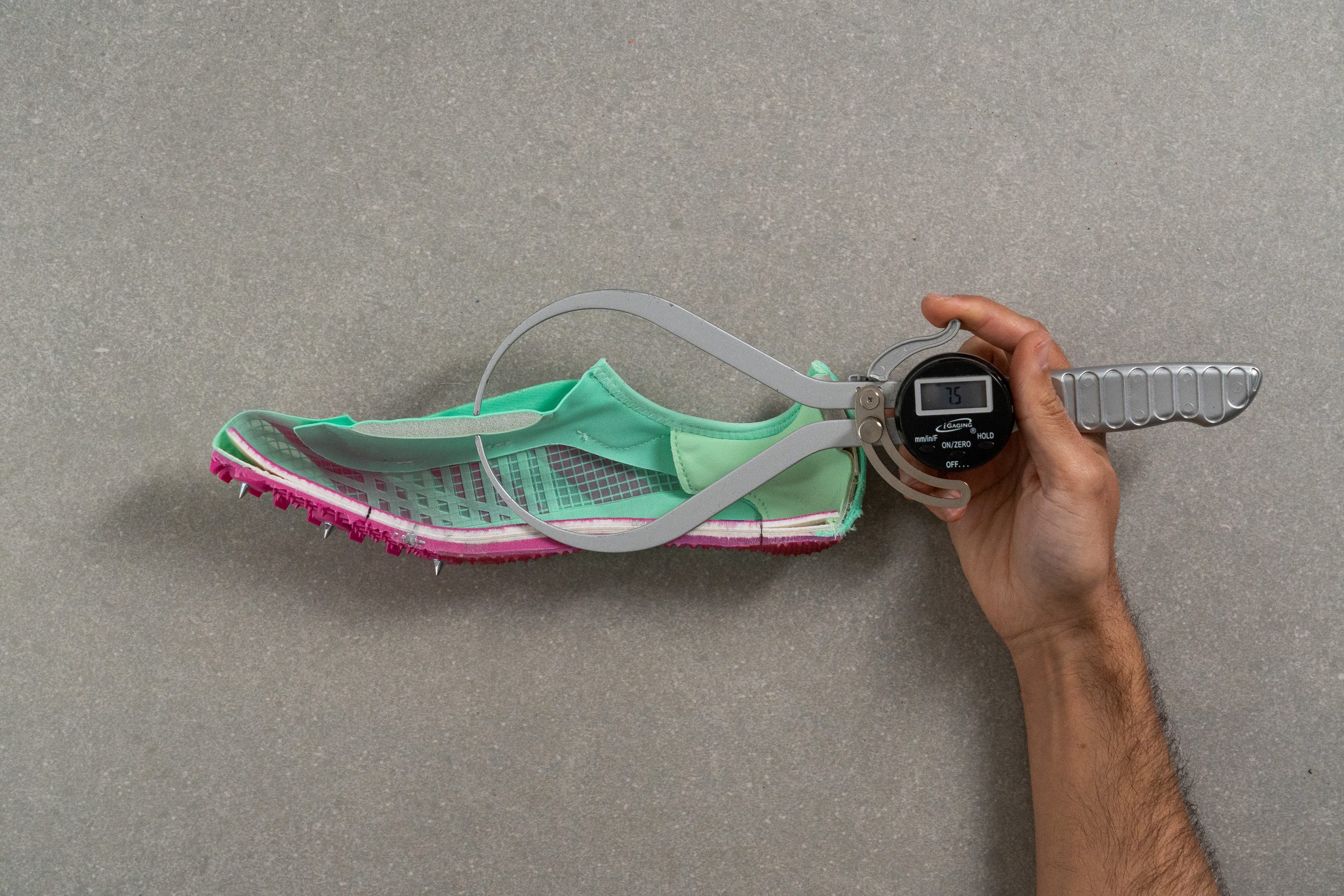
| Sprintstar | 7.5 mm |
| Average | 2.3 mm |
Heel tab
Don't hunt for a heel pull tab, you won't find one! While convenient for road running shoes, these are unheard of in sprint spikes.
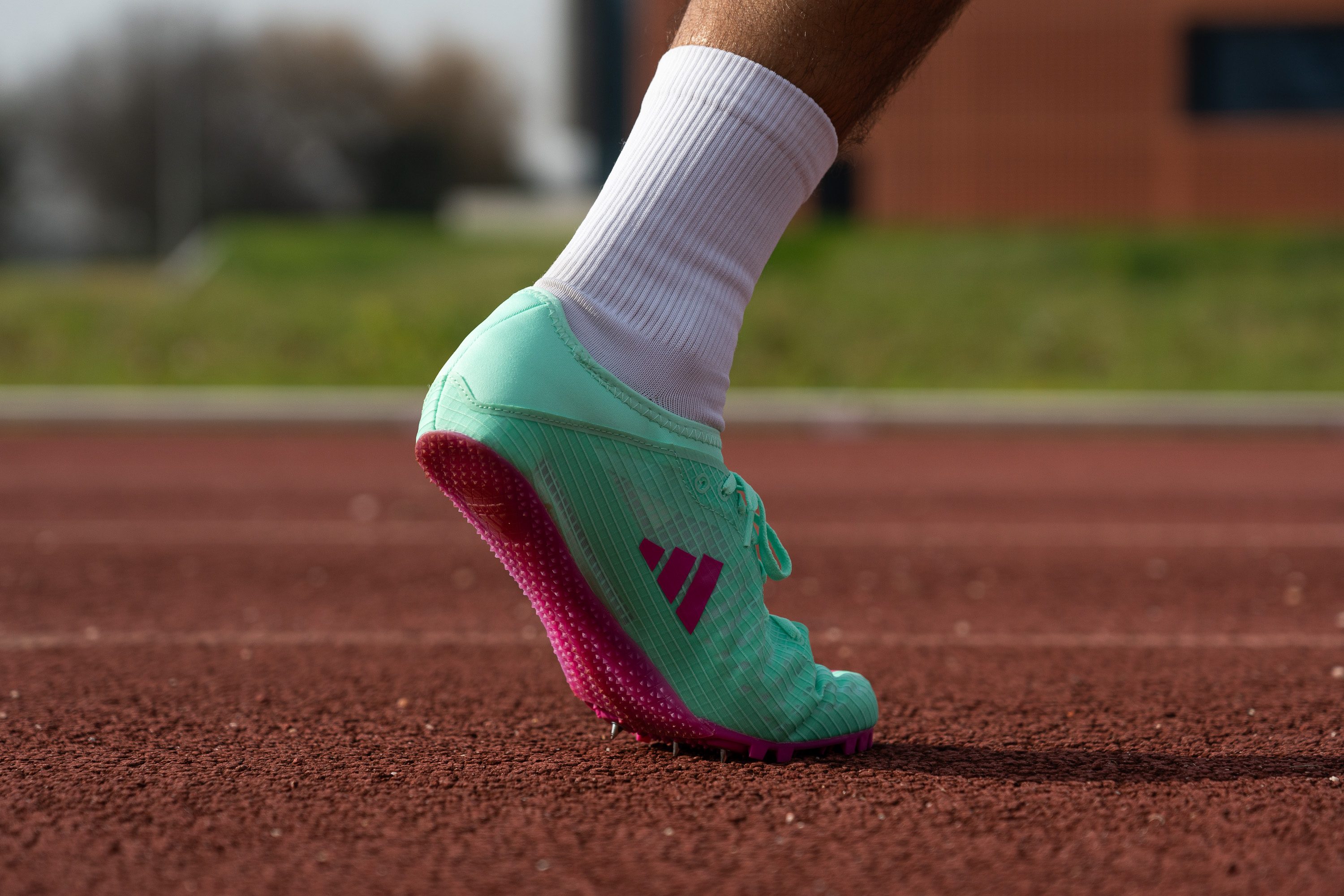
| Sprintstar | None |
Removable pins
The Sprintstar features a familiar 6-pin configuration with fully removable pins. This standard setup mirrors other Adidas spikes, making it easy for experienced sprinters to adapt.
